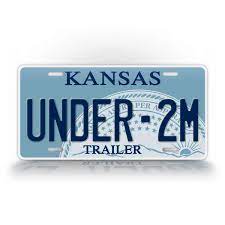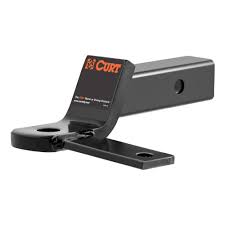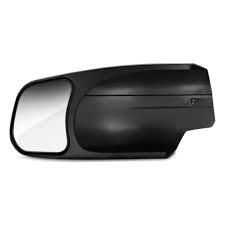Kansas Trailer Laws and Regulations
If you often find yourself towing heavy loads around your state you probably have some idea of the state laws and rules that apply to do this. Some people may not be aware however that sometimes laws can differ state by state. This can mean you might be legal in one state but crossing the border you might well get pulled over for an infringement you were not expecting.
In this article we are going to look at the laws for Kansas which may vary from the state you might be driving in from. There may also be regulations you were not aware of as a native to the state which might catch you out. So read on and let us try to keep you from costly tickets.
Do Trailers Need to Be Registered in Kansas?
Trailers in the state of Kansas do need to be titled and registered by law for the most part but there are some exceptions to this rule. Farmers hauling agricultural products of 6,000 lbs. or less in a trailer do not need a title or register for the unit.
Another exception to the title and registration rules are utility trailers being used for camping that weigh less than 3,000 lbs.

When it comes to proof of ownership trailers that weigh 2,000 lbs. or less including load must complete an affidavit or fact (Form TR-12). Anything from 2,001 lbs. and above with cargo needs a vehicle/motor ownership affidavit (Form TR-90). A Bill of sale is needed to register a trailer in your name.
Kansas General Towing Laws
These are general rules in Kansas regarding towing that you might come foul of if you were not aware of them. Sometimes you may get away with an infringement of these rules because you did not know them but you can not assume this will be the case.
No one can ride on a trailer while it is in motion on a public road
Kansas Trailer Dimension Rules
It is important to know the state laws governing the sizes of loads and trailers. You may need permits for some loads while others may not be allowed on certain types of roads.
- You can not ride in or live in a trailer while it is being towed along public roads in the state.
- The total length of tow vehicle and trailer can not exceed 65 feet including bumpers.
- The maximum length is not specified
- The maximum width for a trailer is 102 inches. This does not include appurtenances.
- The maximum height of a trailer and load is 14 ft.
Kansas Trailer Hitch and Signal Laws
There are laws in Kansas that relate to the trailer hitch and safety signals displayed by the trailer. It is important to be aware of these laws as they are safety based so may carry potentially large fines.
- The vehicle must be able to tow the trailer and load safely and have any appropriate safety chains at the point of connection.
- If towing a second vehicle the first one requires an anti-sway device

Kansas Trailer Lighting Laws
When you are towing something that will obscure the rear lights of your tow vehicle it is important to be able to communicate your upcoming and present actions in the form of lights. This is why there are rules regarding trailer lighting.
- Rear registration plate must be illuminated so as to be visible from up to 50 ft away with a white light.
- Trailers must have at least two rear red reflectors, two stop lamps and two electric turn signal lamps.
- Trailers over 80 inches wide that do not require a special permit need the following:
- Two clearance lamps, one on each side of the front of the trailer. A further two clearance lamps should be on the rear on both sides
- Three identification lamps are required in a horizontal row 6 – 12 inches apart on vehicles made after July 1st 1959.
- Two side markers on either side on both the front and the back of the trailer.
- Two tail lamps on the rear that emit red light that is visible from 1,000 ft away.
Kansas Speed Limits
When it comes to speed limits this varies and depends on the posted speeds of the specific area. You obviously should not exceed the posted speed limit in any area. When it comes to normal towing there are no specific different limits but it is expected that the speed is kept at a sensible level.
- If your trailer is being caused to sway or lose control due to speed you may be pulled over even if you are within the posted limits. This is because the trailer may be posing a threat to public safety and you will be asked to slow down.
- If towing a house trailer you can not exceed 55 mph regardless of the posted speed limit of the road.
Kansas Trailer Mirror Laws
The rules for mirrors in Kansas are not specified although they are likely required and you may be pulled over if you do not have any or they are unusable. If your view is compromised by the width of your load you may want to consider extensions to your existing mirrors. These can be in the form of mirror extenders that slot into already existing wing mirrors.

All cars need at least two mirrors, one left wing mirror as well as either a mirror in the cab to the right of the driver or one on the right wing. You must have at least one to the right of the driver in the cab or on the right wing but both are preferable.
Kansas Brake Laws
The brakes on your tow vehicle and potentially on your trailer are important to the safety of any towing operation. Ensure that they meet state guidelines and adhere to the stated rules for use on the road with a trailer.
- Each combination of vehicles must have a service braking system capable of stopping the vehicles within 40 ft from an initial speed of 20 mph on a flat, smooth dry surface.
- The tow vehicles parking brake must be sufficient to hold the vehicles on any grade under any road conditions.
Conclusion
There are a number of laws in Kansas that pertain to towing and trailers which are designed to keep the roads and road users safe. The state of Kansas pays special attention to lights and reflectors in an effort to allow other road users to know your driving intentions regarding turns and sudden stops.
Link To or Reference This Page
We spend a lot of time collecting, cleaning, merging, and formatting the data that is shown on the site to be as useful to you as possible.
If you found the data or information on this page useful in your research, please use the tool below to properly cite or reference Tow Ratings as the source. We appreciate your support!
-
<a href="http://towratings.net/blog/kansas-trailer-laws-and-regulations/">Kansas Trailer Laws and Regulations</a>
-
"Kansas Trailer Laws and Regulations". Tow Ratings. Accessed on April 26, 2024. http://towratings.net/blog/kansas-trailer-laws-and-regulations/.
-
"Kansas Trailer Laws and Regulations". Tow Ratings, http://towratings.net/blog/kansas-trailer-laws-and-regulations/. Accessed 26 April, 2024
-
Kansas Trailer Laws and Regulations. Tow Ratings. Retrieved from http://towratings.net/blog/kansas-trailer-laws-and-regulations/.